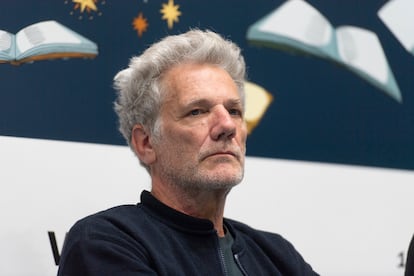Against talent numbers

Strictly opinion pieces that reflect the author's own style. These opinion pieces must be based on verified data and be respectful of individuals, even if their actions are criticized. All opinion columns by individuals outside the EL PAÍS editorial team will include, after the last line, a byline—no matter how well-known—indicating the author's position, title, political affiliation (if applicable), or main occupation, or any that is or was related to the topic addressed.

For some, writing is often a continuous conversation with the poetics of authors who have shaped their lives, their literary world—let's say, the plural, turbulent, and entertaining foreign world they "carry within." Without a doubt, the Argentine Alan Pauls, author of The Borges Factor , is one of them. I just realized this more than ever in an interview with his compatriot Hinde Pomeraniec on the occasion of the release of her new book of essays: Someone Singing in the Next Room . It may not seem like it, but it's a Virginia Woolf-esque title. In the interview, she clarifies this when Pomeraniec encourages her to comment on the title, and she confesses that she took it from an essay by Virginia Woolf in which she talks about why she finds it so difficult to read her contemporaries and why it's even more difficult to write about them. It was an essay by Woolf that took the form of a letter to a nephew who had reproached her for not writing about her contemporaries. In her reply, Woolf said that this was impossible for her because , for her, her contemporaries were people singing in the next room. And although one might say that Woolf said this with a certain disdain , Alan Pauls loved the phrase because it revived the idea that all the people and works he writes about can be considered contemporaries, since, after all, they are still literatures with which he is in conversation.
In fact, the conversation element is essential to Pauls's new book: "I thought it was important to include dialogues in a book of essays. Because for me, there's something about the essay genre that has a lot to do with that."
Suddenly, the interview turns to some words by Alan Pauls that could even be sacred to me, because in them he talks about how, while writing the book, he realized that he was actually collecting essays on poetics that somehow comprised him : “Because in this book, one can read what I'm made of. And see that there's a kind of X-ray of my chemistry as a writer, based on all those I've been feeding on, plundering, vampirizing. And in that sense, I think it's a very loving book. I've eliminated the ones that are critical—in the sense of being aggressive or challenging.”
But there are, Pomeraniec points out, severe reprimands for certain reviewers who were harsh on people like Roberto Arlt. Or like Kafka. Well, Pauls says, because they are writers who for me are obviously very important, but also very important was the way in which certain readings of those writers imposed an image of what they did and their practices that was completely, I don't know if false, but let's say, very questionable. Until a moment came when those writers were well read, or read in an innovative way , and suddenly there, those writers "unfolded all the potential that the other readings sought to lull."
Oh, I'm left thinking about this hellishly hot Madrid, where it would be worth going on a hunt for so many numbing factors of literary talent.
Do you want to add another user to your subscription?
If you continue reading on this device, it will not be possible to read it on the other device.
ArrowIf you want to share your account, upgrade to Premium, so you can add another user. Each user will log in with their own email address, allowing you to personalize your experience with EL PAÍS.
Do you have a business subscription? Click here to purchase more accounts.
If you don't know who's using your account, we recommend changing your password here.
If you decide to continue sharing your account, this message will be displayed indefinitely on your device and the device of the other person using your account, affecting your reading experience. You can view the terms and conditions of the digital subscription here.

Enrique Vila-Matas (1948). A writer who blends fiction and essay. His notable works include "A Brief History of Portable Literature," "Bartleby and Company," "Montano's Illness," "Kassel Does Not Invite Logic," and "Montevideo." He has won the Prix Médicis-Étranger, the Guadalajara International Book Fair Prize, the Formentor Prize, and the Rómulo Gallegos Prize. He has been translated into 38 languages.
EL PAÍS




%3Aformat(jpg)%3Aquality(99)%3Awatermark(f.elconfidencial.com%2Ffile%2Fbae%2Feea%2Ffde%2Fbaeeeafde1b3229287b0c008f7602058.png%2C0%2C275%2C1)%2Ff.elconfidencial.com%2Foriginal%2F971%2Ff84%2Fe1d%2F971f84e1d7a37c099494052782989fdf.jpg&w=3840&q=100)

